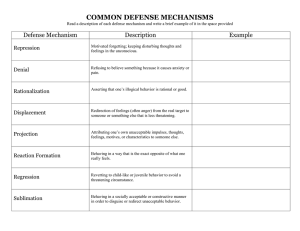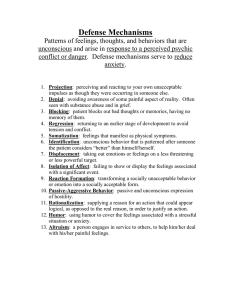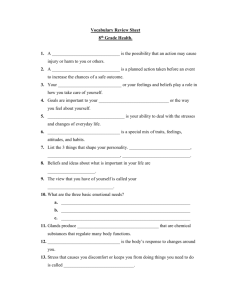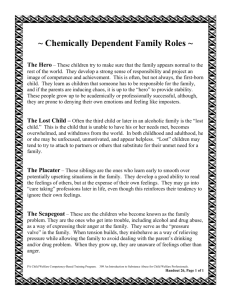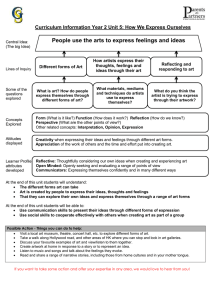Defense Mechanism Worksheet - Centerville Public Schools
advertisement
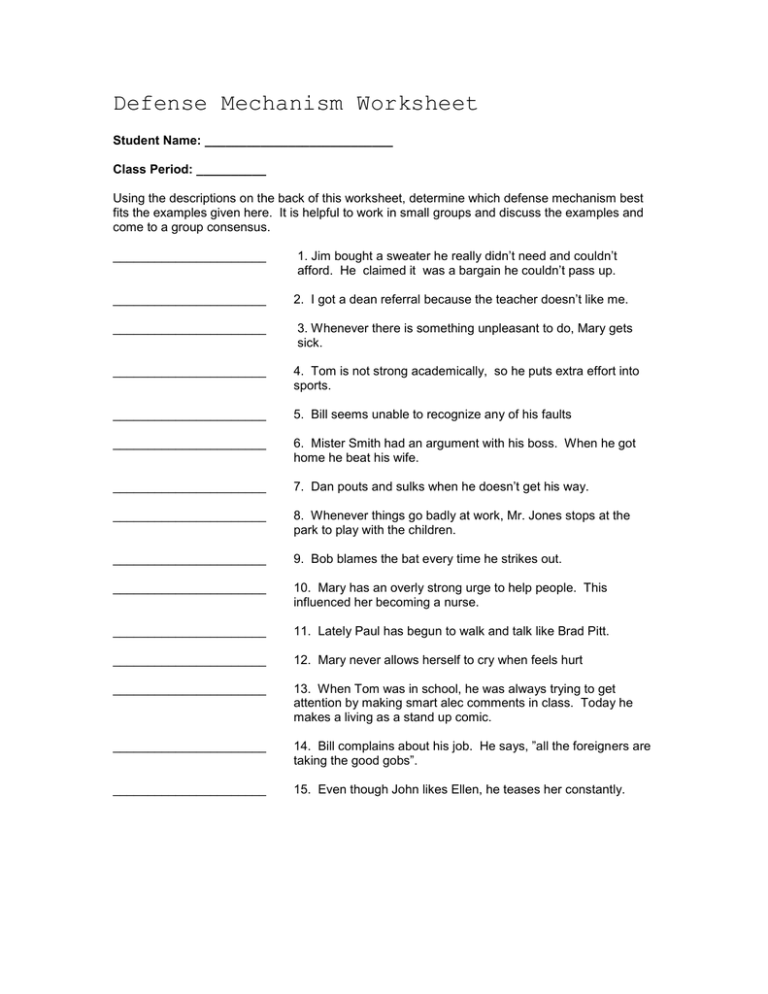
Defense Mechanism Worksheet Student Name: ___________________________ Class Period: __________ Using the descriptions on the back of this worksheet, determine which defense mechanism best fits the examples given here. It is helpful to work in small groups and discuss the examples and come to a group consensus. ______________________ ______________________ 1. Jim bought a sweater he really didn’t need and couldn’t afford. He claimed it was a bargain he couldn’t pass up. 2. I got a dean referral because the teacher doesn’t like me. ______________________ 3. Whenever there is something unpleasant to do, Mary gets sick. ______________________ 4. Tom is not strong academically, so he puts extra effort into sports. ______________________ 5. Bill seems unable to recognize any of his faults ______________________ 6. Mister Smith had an argument with his boss. When he got home he beat his wife. ______________________ 7. Dan pouts and sulks when he doesn’t get his way. ______________________ 8. Whenever things go badly at work, Mr. Jones stops at the park to play with the children. ______________________ 9. Bob blames the bat every time he strikes out. ______________________ 10. Mary has an overly strong urge to help people. This influenced her becoming a nurse. ______________________ 11. Lately Paul has begun to walk and talk like Brad Pitt. ______________________ 12. Mary never allows herself to cry when feels hurt ______________________ 13. When Tom was in school, he was always trying to get attention by making smart alec comments in class. Today he makes a living as a stand up comic. ______________________ 14. Bill complains about his job. He says, ”all the foreigners are taking the good gobs”. ______________________ 15. Even though John likes Ellen, he teases her constantly. Defense Mechanisms Definition: Defense Mechanisms contribute to mental health by providing relief from stressful situations. However, too much dependence on them can lead to avoidance in facing problems. Denial: Refusal to accept reality. Carol’s longtime pet has died. She continues to act as if it were still alive. Escape or Fantasy: Running away from problems through daydreams, books or excessive sleep. Rationalization: An attempt to justify one’s actions with an excuse. Anne justifies flunking a math test because she was absent the day it was scheduled. Projection: An attempt to protect one’s feelings or self-esteem by blaming others. Bill blamed his teacher’s dislike of him for his poor grade. Repression: The unconscious exclusion or holding back feelings. You forget about chores you are supposed to do on the weekend allowing yourself to enjoy the company of friends instead. Suppression: The conscious holding back of thoughts or feelings. You think that showing frustration is a sign of weakness so you hold those feelings inside and don’t express them. Identification: Acting like, or modeling behaviors after a person someone likes. Displacement: Directing feelings at someone or something other than the source of those feelings. Angry at not making the team, sarah pushes her little sister when she gets home. Regression: Acting as if one was back in an earlier less troublesome time in their life. Compensation: An attempt to make up for a weakness in one area by excelling in another area. Sublimation: Transforming unacceptable behaviors into acceptable ones. A very aggressive person might become a professional athlete. Conversion: Emotional problems result in real physical ailments. Excessive worrying can cause headaches. Reaction Formation: Acting outwardly the opposite of what one feels.

